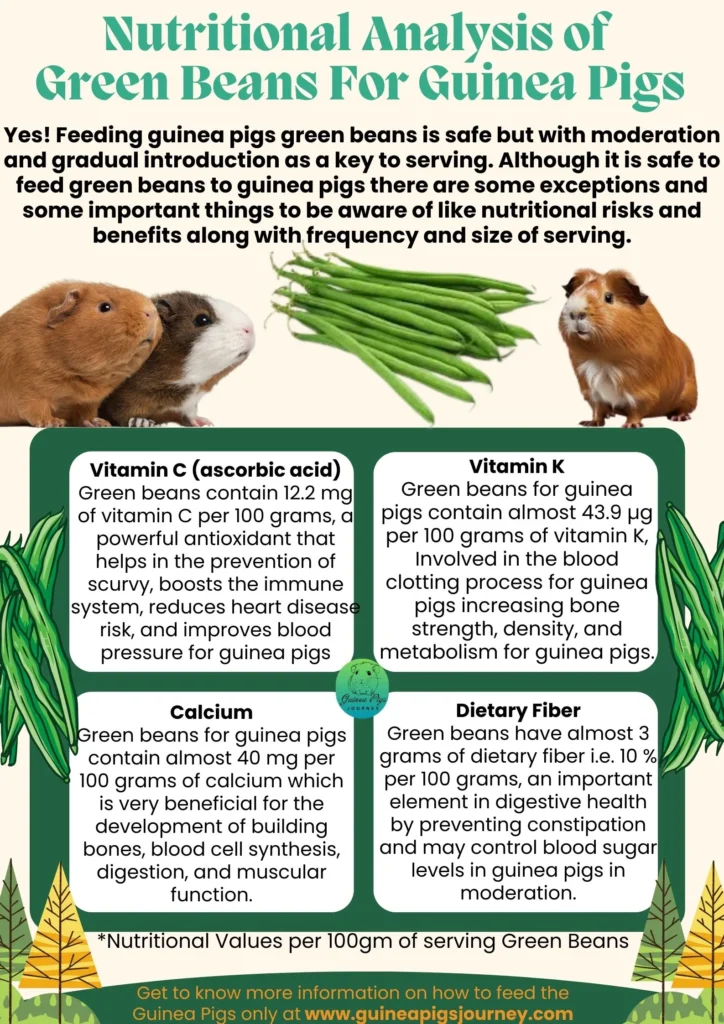Green beans! With juicy texture and vibrant colors like asparagus, sugar snap peas, zucchini, mustard greens, cilantro, and arugula it seems like a tempting dish for humans, but being a guinea pig’s parent you must be thinking about this tempting treat “Green beans for Guinea Pigs” also known as French beans or string beans and you must have a query in mind; Can guinea pigs eat green beans?
The simple answer is Yes! Feeding guinea pigs green beans is safe but with moderation and gradual introduction as a key to serving. Although it is safe to feed green beans to guinea pigs there are some exceptions and some important things to be aware of like nutritional risks and benefits along with frequency and size of serving.
Being a responsible and caring owner, we all need to understand the basic nutritional requirements and the safe food we are going to serve these cute furry friends. After going through a long guinea pig journey and experience I have researched green beans for guinea pigs thoroughly, so let’s quickly go through all the facts and figures including those related to green beans for guinea pigs.
Guinea Pigs Nutritional Requirements:
Guinea pigs are herbivore creatures which means they eat only a plant-based diet. Their recommended and the best food is high-quality hay, some pallets, fruits, and veggies in moderation. Hay should make up most of their diet as a main staple i.e. almost 80 % whereas pallets are in small quantities. Up to 10% of their diet is a variety of fresh vegetables and fruits with the daily or weekly diet plan.
It is important to note that fruits must be incorporated in small and limited quantity to due to their rich sugar content. They require a daily dose of almost 10-30 mg of vitamin C as they cannot produce their own. Vitamin C helps guinea pigs boost their immune system and prevent scurvy which is a dangerous disease that can also lead to malnutrition in guinea pigs. Low in fats and sugar diets are best for guinea pigs to perform their life activities.
Always ensure to provide them with fresh, clean, chlorine-free, drinking water that must be changed daily to maintain a healthy lifestyle.
Also, Read those foods not recommended to feed your guinea pigs:
It is very important to ensure their balanced diet with proper care for their overall health. For this reason, always introduce new food including green beans for guinea pigs in moderation and gradual introduction into their diet. Green beans for guinea pigs, can be a healthy and tasty treat and one of the new additions in moderation. Green beans for guinea pigs contain some essential nutrients, Vitamins, minerals, and fiber. Green beans also contain oxalic acid causing bladder stones and calcium causing urinary tract issues if fed excessively to guinea pigs. So, extra care and understanding of the nutritional analysis of green beans for guinea pigs is very important to maintain a suitable, balanced, and healthy diet plan.
Nutritional Analysis of Green Beans for Guinea Pigs:

According to the USDA Nutrient Database, green beans for guinea pigs are a great source of important nutrients, minerals, vitamins, fiber, and other many nutritional benefits if fed in moderation, whereas excessive feeding can cause many serious health-related issues. So, the nutritional understanding of green beans for guinea pigs is very crucial to introducing this juicy vegetable in the guinea pigs diet. Tabulated below are the nutritional values and percentages per 100 grams of green beans for guinea pigs.
| Nutrients | Value per 100 grams | DV % |
| Calories | 40 kcal | |
| Carbohydrates | 7.41 grams | 3 % |
| Water | 89.7 grams | |
| Fat | 0.28 gram | 0 % |
| Protein | 1.97 grams | 4 % |
| Dietary Fiber | 3 grams | 10 % |
| Sugar | 2.33 grams | |
| Ash | 0.68 grams | |
| Net Carbs | 4.27 grams | |
| Vitamin C, total ascorbic acid | 12.2 mg | 14 % |
| Vitamin E | 0.41 mg | |
| Vitamin A, RAE | 54 µg | 4 % |
| Vitamin K | 43.9 µg | 36 % |
| Vitamin B6 | 0.121 mg | 8 % |
| Vitamin D | 0 mcg | 0 % |
| Cholesterol | 0.00 mg | 0 % |
| Fatty Acid | 0.00 mg | 0 % |
| Calcium, Ca | 40 mg | 3 % |
| Phosphorus, P | 41 mg | 3 % |
| Potassium, K | 290 mg | 4 % |
| Iron, Fe | 0.65 mg | 6 % |
| Magnesium, Mg | 28.2 mg | 6 % |
| Zinc, Zn | 0.35 mg | 2 % |
| Sodium, Na | < 2.5 mg | 0 % |
| Copper, Cu | 0.098 mg | 8 % |
| Manganese | 0.332 mg | 9 % |
| Folate | 33 µg | 8 % |
Note: * The % Daily Value (DV) indicates how much a nutrient in a serving of food is subsidized to a daily diet.
What Are The Nutritional Benefits of Green Beans For Guinea Pigs?

Vitamin C: Green beans contain 12.2 mg of vitamin C per 100 grams which is also a powerful antioxidant associated with impressive health benefits for guinea pigs like prevention from scurvy, boosted immune system, reduced heart disease risk, and improved blood pressure as well as fighting against some infections like upper respiratory and fungal infections which can be very dangerous for guinea pigs life. It’s also integral for the production of collagen and helps guinea pigs protect their skin from oxidative stress.
Although the amount of vitamin C in green beans for guinea pigs is comparatively less as compared to other green veggies like sugar snap peas, asparagus, zucchini, arugula, mustard greens, and cilantro, you can mix them with other veggies to enhance the nutritional benefits.
Vitamin K: Green beans for guinea pigs contain almost 43.9 µg per 100 grams of vitamin K, which is involved in the blood clotting process for guinea pigs whenever they get any injury or minor scrapes or wounds in their skin caused by any fungal infection. Vitamin K is also involved in increasing bone strength, density, and metabolism for guinea pigs. Vitamin K plays a key role in heart health by preventing the calcification of blood vessels and lowering blood pressure, which could decrease the risk of heart disease in guinea pigs.
Calcium: Green beans for guinea pigs contain almost 40 mg per 100 grams, which is very beneficial for the development of bones, blood cell synthesis, digestion, and muscular function. But ensure balance in the Calcium to Phosphorus Ca:P ratio because both these minerals work together to help guinea pigs build the bones and maintain them, for this reason, green beans are the selected and opted vegetable in regards to Ca:p ratio which is 1:1 when introducing it in guinea pigs diet.
Dietary Fiber: Green beans have almost 3 grams of dietary fiber i.e. 10 % per 100 grams, an important element in digestive health by preventing constipation and may control blood sugar levels in guinea pigs in moderation. Fiber is also important for weight loss and subsequently defends the risk of diabetes in guinea pigs.
What Are The Risks Of Feeding Green Beans To Guinea Pigs?

Kidney / Bladder Stone: Green Beans contain Oxalic acid which in excess amount can be harmful for guinea pigs so ensuring the proper amount of green beans intake by guinea pigs is very important. In excess, it may lead to very serious health concerns causing the production of calcium stones in the Kidney or bladder that can be very painful for guinea pigs and only removed through surgical methods.
Allergic Reactions: Always monitor the guinea pigs after introducing any new food including green beans for guinea pigs and make sure that you have limited the size and portion of serving at the start of any new food. If you see any kind of allergic reaction like itching on the skin etc. consult your vet immediately to check the guinea pigs. And stop introducing that food till the time guinea pig is good to go with.
Pesticides or chemicals: It is always recommended to purchase organically grown green beans having non-GMO verified product labels on their packaging because they may contain some toxic pesticides, chemicals, or sprays while harvesting or in stores. It is best to wash thoroughly in cold running water to remove any kind of pesticides or chemicals on green beans before serving them to guinea pigs.
Urinary tract Issues: Your little guinea pigs are so sensitive that their little organs are not as capable of absorbing calcium and utilizing it fully in their bodies, so if an excess amount of calcium is accumulated in their bodies it can affect their kidney and bladder which can ultimately lead to the urinary tract issues.
How Should You Feed Green Beans to Guinea Pigs?
Keeping in mind these lovely creatures’ sensitive digestive systems, you must always opt for organic food for your cavies to ensure the optimum nutritional requirements and healthy digestion by guinea pigs.

The first thing to follow is the moderation and gradual introduction law as a key for serving any food including green beans. You must ensure that any food you are offering including green beans must be thoroughly washed in running water so that any dust particles, pesticides, or chemicals are not ingested by guinea pigs that can cause serious health issues for cavies. Always look for any rotten or spoiled parts and do not offer such types of food to guinea pigs. Also, ensure that green beans are fresh, and do not feed guinea pigs with wilted green beans as it can cause digestive issues in guinea pigs.
Always monitor your guinea pigs’ reaction and observe any kind of allergic reaction or liking or disliking by your guinea pigs for green beans, also look for any behavioral change in guinea pigs after eating green beans, and if you notice any kind of such activity as sated or other factor you assume that it is something different from usual, do not hesitate to give a call to near veterinarian for good guidance and check-up.
How Often Can Guinea Pigs Eat Green Beans? (Frequency and Portion of Serving Green Beans)
Excessive feeding of any food including green beans can cause serious health issues due to the imbalance of nutrients recommended for guinea pigs’ daily requirements. So, it is recommended that you follow the proper guidelines and ensure good care while offering any new food including green beans. So, let’s know about how to serve the green beans in guinea pigs’ diet.
Frequency of Serving Green Beans For Guinea Pigs:
It is always recommended that you make a food chart for your cavies after noticing every guinea pig you have to ensure a balanced diet, frequency, and portion of serving week-wise or every month. The recommended frequency is two or three times a week of serving green beans which are organically produced raw green beans to ensure moderation and safe feeding. As a good treat, you can also mix green beans with other veggies like sugar snap peas, asparagus, arugula, zucchini, mustard greens, etc.
The portion of Serving Green Beans For Guinea Pigs:
After washing green beans thoroughly and ensuring fresh quality, cut green beans into small, bite-size pieces and serve a couple of pieces about not more than one or two whole average sized or 100 grams per serving, adjust the portion of serving based on the size, age, and gender of your guinea pigs as younger ones require smaller portion then elder ones.
Which Part of Green Beans Is Safe to Feed Guinea Pigs?
As we know now guinea pigs can eat green beans and love to enjoy these tasty and crunchy green beans in moderation but do you know what part of green beans is safe to feed guinea pigs to ensure safety and overall health? Let’s quickly go through these different parts of green beans for guinea pigs.

Can Guinea Pigs Eat Green Beans End?
Yes, Guinea pigs can eat the end part of green beans but ensure in moderation and thoroughly wash it before serving to guinea pigs. Being fibrous would add nutritional benefits to guinea pigs’ diet.
Can Guinea Pigs Eat Green Beans Skin?
Yes, it is safe to feed guinea pigs with skin of green beans in moderation which contains essential nutrients and there is no need to peel green beans before serving guinea pigs. Wash them thoroughly before serving to remove any dirt or pesticides on them.
Can Guinea Pigs Eat Green Beans Seeds / Pods?
Yes, Guinea pigs can eat the seeds or pods of green beans which are young and immature in moderation, while avoid feeding mature seeds or pods as it becomes unsafe for guinea pigs causing choking hazards. These are packets of fibers that can help guinea pigs in good digestion as guinea pigs have sensitive digestive systems.
Can Guinea Pigs Eat Green Beans Plant Flowers?
Yes, flowers of green beans are safe to feed guinea pigs in moderation but monitor the individual guinea pig’s like or dislike for green bean flowers as these are not commonly consumed by them.
Can Guinea Pigs Eat Green Beans Plant Leaves and Vines?
Although the leaves and vines are not typically offered to guinea pigs yes, it is safe to offer fresh and soft green bean leaves and vines in moderation to limit the size by keeping in mind the other food you have offered as these offer additional nutritional benefits and variety in guinea pigs diet and health. Also, wash these parts thoroughly to ensure that they are free from any kind of chemicals, pesticides, or contaminants that can cause serious health issues to guinea pigs.
Can Guinea Pigs Eat Stems Of Green Beans Plant?
No, avoid feeding the stem part of the green bean plant to guinea pigs. The stem can be hard, tough, and difficult to digest, leading to digestive issues or choking hazards for guinea pigs. It’s best to stick to feeding them the safe and tender parts of the green bean plant, such as the beans, leaves, and vines.
Can Guinea Pigs Eat Green Beans Plant Roots?
No, avoid feeding the root part of green bean plants to guinea pigs as it may cause serious health-related issues due to some toxic substances present in the root part of green bean plants. Stick to feeding them the safe parts like seeds or pods, beans, leaves, or vines.
Can Guinea Pigs Eat Green Beans of All Types?
Although guinea pigs can eat different types of green beans some green beans should be avoided to offer them to make it a safe and healthy treat for guinea pigs. So, let’s quickly go through these types of green beans for guinea pigs.

Can Guinea Pigs Eat Sugar Snap Peas?
Although it is not technically a bean but belongs to the family of legumes like green beans and sugar snap peas snap peas are safe to feed guinea pigs as they also provide numerous nutritional benefits for them.
Can Guinea Pigs Eat Green Beans Dwarf?
Yes, dwarf beans are particularly safe to feed guinea pigs in moderation due to their soft tender texture and smaller size making them easier to chew, swallow, and digest and they also provide nutritional benefits for guinea pigs. The dwarf bean (Phaseolus vulgaris) has several other names, such as the French, common, kidney, flageolet, and haricot bean.
Can Guinea Pigs Eat Green Beans Long?
Although these long beans are slightly tougher still you can feed fresh and soft long beans to guinea pigs in moderation adding nutritional benefits to the guinea pigs’ diet. A long bean may look like a thin extra-long version of our familiar pole or bush “green” bean, but the two are not closely related. The long bean is classified as species vigna unguiculata, subspecies sesquipedalis.
Can Guinea Pigs Eat French Beans?
Guinea pigs can eat French beans, also known as green beans or string beans, in moderation as an occasional part of their diet. French beans are rich in vitamins and minerals like magnesium which have antioxidant properties that support the metabolism of your guinea pigs’ health. Manganese also promotes the quick healing of wounds and supports the bone health of your guinea pigs.
A study suggests that regular consumption of French beans may reduce the chances of cancer. They contain vitamin C, which is essential for guinea pigs since they cannot produce it on their own and need to obtain it from their diet like dandelions, broccoli, basil, rosemary, french beans, etc. Vitamin C helps support their immune system and overall well-being.
French beans also have a decent amount of B9 or folate, which can help lower levels of homocysteine in the body of your guinea pigs. Thus, consuming French beans can be beneficial for brain health as well. Fiber in French beans aids digestion and helps prevent gastrointestinal issues in guinea pigs. Additionally, they are low in sugar and calories, making them a healthy option for guinea pigs to enjoy without worrying about weight gain. However, it’s essential to provide them with raw French beans or green beans and ensure they are introduced gradually to prevent any digestive issues.
Can Guinea Pigs Eat Runner Beans?
No, avoid feeding runner beans also known as pole beans to guinea pigs as they contain a toxic compound known as lectin which can be harmful for guinea pigs to consume, potentially leading to digestive and other health-related issues. It is recommended to stick to safe beans like green beans, dwarf beans, or long beans which are better suited to their dietary needs.
Can Guinea Pigs Eat Broad Beans?
No, avoid feeding guinea pigs the broad beans also known as fava beans due to their rich amount of potassium and other toxin compounds that can cause digestive issues and health problems.
Can Guinea Pigs Eat Canned Green Beans?
No, it is not recommended to feed guinea pigs canned green beans as they contain flavors, additives, and preservatives and are also rich in sugar syrup that can cause serious digestive issues and health problems for guinea pigs. It is recommended to choose or buy organically produced raw green beans for guinea pigs.
Can Guinea Pigs Eat Cooked or Processed Green Beans?
No, it is not recommended to offer any kind of cooked food including green beans to guinea pigs as it contains seasonings, salts, oil, or other spices that can cause serious digestive issues for guinea pigs because their digestive system is not that prepared to digest or handle such cooked food.
Can Guinea Pigs Eat Dried Green Beans?
No, it is not recommended to feed dried green beans to guinea pigs because dried green beans are dehydrated, and the dehydration procedure concentrates sugars and alters the texture. The high sugar content in dried peas can be problematic for guinea pigs, potentially leading to digestive issues or obesity subsequently leading to diabetes.
Can Guinea Pigs Eat Frozen Green Beans?
Yes, guinea pigs can eat frozen green beans in moderation but it is very important to ensure that these frozen green beans are not frozen more than 3 days and avoid offering them cold beans directly from the freezer as it can upset their stomach and cause dental issues and may also lead to dislike by guinea pigs. Ensure that these frozen green beans’ temperature is normal to room temperature before feeding them to guinea pigs.
Can Guinea Pigs Eat Boiled Green Beans?
No, avoid feeding boiled green beans to guinea pigs because it is not the recommended form of preparation as boiling green beans can lead to a loss of some important nutrients, and making them softer is not ideal for their teeth, So it is recommended to provide them crunchy texture green beans as a fresh raw form.
Can Baby Guinea Pigs (Pups) Eat Green Beans?

Yes, at the age of 4 to 6 weeks baby guinea pigs (pups) can start to eat green beans but in moderation, gradual introduction is the key to limiting the frequency and portion of serving to baby guinea pigs. Green beans offer multiple nutrients, vitamins, and minerals for baby guinea pigs need for their overall growth, development, and good health.
Green beans for guinea pigs also provide fairly easy digestion by baby guinea pigs due to high fiber content as compared to other veggies and do not cause digestive upset if fed in moderation and gradually, also monitor the reaction and behavior of baby guinea pigs if it is the first time you are offering any new food including green beans to baby guinea pigs.
Can Guinea Pigs Eat Green Beans Every Day?
No, it is not recommended to feed green beans to guinea pigs every day as a part of a balanced diet because it can cause stomach upset like diarrhea for guinea pigs. As a varied diet plan introduce a variety of other safe foods in the guinea pig’s diet.

Are Green Beans OK For Guinea Pigs?
Overall it is OK to feed organically produced raw green beans to guinea pigs! offering numerous health and nutritional benefits to guinea pigs if fed in moderation and gradual introduction. But always remember that excess of any food can be bad for guinea pigs causing digestive issues and serious health problems.







